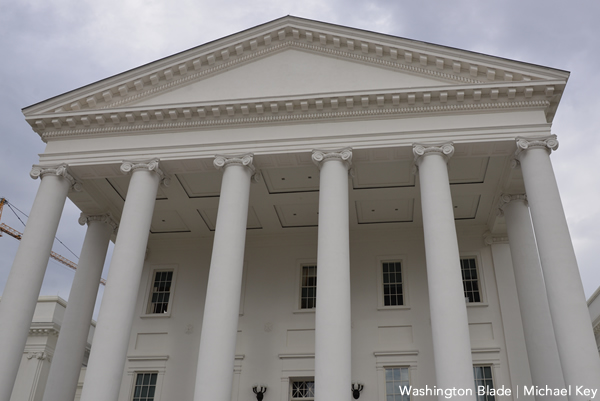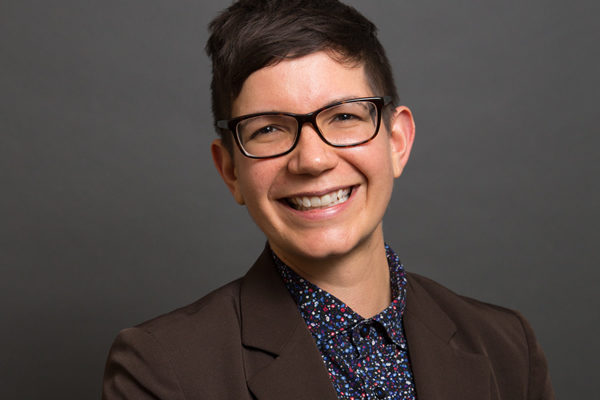Local
Va. lawmakers, activists vow to defend LGBTQ rights gains
Republicans regained control of House of Delegates last November

The Virginia General Assembly’s 2022 legislative session began on Wednesday amid concerns that Republicans will try to curtail LGBTQ rights.
Republicans last November regained control of the Virginia House of Delegates, and now have a 52-48 majority. Democrats still maintain a 21-19 majority in the Virginia Senate.
Governor-elect Glenn Youngkin, Lieutenant Gov.-elect Winsome Sears and Attorney General-elect Jason Miyares take office on Saturday. All three defeated their Democratic challengers — Terry McAuliffe, former state Del. Hala Ayala (D-Prince William County) and outgoing Attorney General Mark Herring respectively — last November.
Democrats, who in 2019 regained control of the General Assembly for the first time since the 1990s, passed a series of LGBTQ rights bills that outgoing Gov. Ralph Northam signed. These include the Virginia Values Act, which added sexual orientation and gender identity to Virginia’s nondiscrimination law, and a ban on so-called conversion therapy for minors.
Northam in 2020 signed a law that repealed the state’s statutory ban on marriage and civil unions for same-sex couples. Virginia that same year became the 38th state to ratify the Equal Rights Amendment.
The Virginia Department of Education in 2020 issued guidelines that are designed to protect transgender and non-binary students.
Youngkin during his campaign against McAuliffe expressed support for Tanner Cross, a gym teacher at a Leesburg elementary school who was suspended from his job after he spoke out against the policy. Youngkin has also said he does not support allowing trans children to play on sports teams that are consistent with their gender identity.
Vee Lamneck, executive director of Equality Virginia, a statewide LGBTQ rights group, on Wednesday in an email to the Washington Blade noted Youngkin has nominated former Heritage Foundation President Kay Coles James to become the next Secretary of the Commonwealth. Lamneck notes the Heritage Foundation “has a long history of spreading harmful, anti-LGBTQ rhetoric” and James herself has said the Equality Act, which would add sexual orientation and gender identity to federal civil rights laws, is “anything but equality.”
“This is unacceptable,” said Lamneck.
State Sen. Travis Hackworth (R-Tazewell County) last month introduced Senate Bill 20, which would eliminate the requirement that school districts must implement the Department of Education’s trans and non-binary student guidelines. State Del. Danica Roem (D-Manassas), who in 2018 became the first openly trans person seated in any state legislature in the U.S., on Tuesday told the Blade during a telephone interview that she expects SB 20 “would be dead on arrival” in committee.
“I would strongly encourage LGBTQ folks and our allies and champions to contact their state senators about SB 20, let them know that this is a thing and that they do need to oppose it,” said Roem. “This is a year where if there is a state legislator who introduces anti-LGBTQ legislation we should as a community and as a Democratic Party specifically should really make a statement and defeat that loudly and make a very, very clear statement that as long as we have at least divided government, we are not going back on what we have done to make Virginia one of the most LGBTQ-inclusive states in the country.”
Roem also reiterated her pledge to fight for trans youth in Richmond.
“I will be a brick wall on the House floor, and I will fight my heart out defending trans kids,” she said.
State Dels. Mark Sickles (D-Fairfax County) and Dawn Adams (D-Richmond), who are openly gay and lesbian respectively, both won re-election. State Sen. Adam Ebbin (D-Alexandria) remains the only openly gay member of the Senate.
Ebbin on Wednesday told the Blade during a telephone interview that Youngkin since his election has not specifically indicated whether he will try to rescind the Department of Education guidelines.
“We have to be vigilant and be weary of executive actions and be ready to combat any,” added the Alexandria Democrat.
Lamneck echoed Ebbin and Roem.
“Given the new political climate in Virginia, we know that many are worried about the future of LGBTQ equality in our commonwealth,” said Lamneck.
They acknowledged the House is “less friendly,” but added the Senate “remains unchanged.”
“We will work with the Senate’s pro-equality majority to act as a crucial back stop against harmful legislation and efforts to roll back our hard-earned wins passed during the last two years,” said Lamneck. “Bills have already been introduced that would weaken both the Virginia Values Act and the Virginia Department of Education’s guidelines for the treatment of transgender students. We can’t allow this to happen. We will continue to build bipartisan partnerships and mobilize advocates to change hearts and minds so that we can prevent any anti-LGBTQ bills from becoming law.”

State Sen. Steve Newman (R-Bedford County), who, along with former state Del. Bob Marshall (R-Prince William County), co-authored an amendment to the state constitution that defines marriage as between a man and a woman, co-chairs Youngkin’s transition team.
Virginia voters approved the Marshall-Newman Amendment in 2006. Roem in 2017 defeated Marshall.
The General Assembly last year approved a resolution that seeks to repeal the Marshall-Newman Amendment. It must pass in two successive legislatures before it can go to the ballot.
Ebbin last month introduced the resolution. He told the Blade that he remains “hopeful” it will pass, but “I’m trying not be over confident.”
A law that requires Virginia’s Department of Motor Vehicles to offer driver’s licenses with a “non-binary” gender marker took effect in 2020. Roem told the Blade she is considering a bill that would allow marriage certificates with non-binary gender markers.
Roem introduces bill to cap FOIA fees
Virginia legalized marijuana in 2020.
Ebbin said he plans to introduce bills that would further regulate marijuana sales in the state.
Roem has put forth measures that would reform Virginia’s court-appointed adult guardianship system, expand funding for transportation safety measures and cap fees that municipalities can charge journalists who file Freedom of Information Act requests. Roem has also introduced a bill that would expedite the process through which students can receive free meals at school.
“How about instead of singling out and stigmatizing kids … we feed them instead,” she said.
District of Columbia
D.C. Black Pride theme, performers announced at ‘Speakeasy’
Durand Bernarr to headline 2026 programming

The Center for Black Equity held its 2026 DC Black Pride Theme Reveal event at Union Stage on Monday. The evening, a “Speakeasy Happy Hour,” was hosted by Anthony Oakes and featured performances by Lolita Leopard and Keith Angelo. The Center for Black Equity organizes DC Black Pride.
Kenya Hutton, Center for Black Equity president and CEO, spoke following the performances by Leopard and Angelo. Hutton announced this year’s theme for DC Black Pride: “New Black Renaissance.”
Performers for 2026 DC Black Pride were announced to be Bang Garcon, Be Steadwell, Jay Columbus, Bennu Byrd, Rue Pratt and Akeem Woods.
Singer-songwriter Durand Bernarr was announced as the headliner for the 2026 festivities. Bernerr gave brief remarks through a video played on the screen at the stage.
DC Black Pride is scheduled for May 22-25. For more information on DC Black Pride, visit dcblackpride.org.
Virginia
Arlington LGBTQ bar Freddie’s celebrates 25th anniversary
Owner asks public to support D.C.-area gay bars

An overflowing crowd turned out Sunday night, March 1, for the 25th anniversary celebration of Freddie’s Beach Bar, the LGBTQ bar and restaurant located in the Crystal City section of Arlington, Va.
The celebration began as longtime patrons sitting at tables and at the bar ordered drinks, snacks, and full meals as several of Freddie’s well-known drag queens performed on a decorated stage.
Roland Watkins, an official with Equality NoVa, an LGBTQ advocacy organization based in the Northern Virginia areas of Arlington, Alexandria, and Fairfax County, next told the gathering about the history of Freddie’s Beach Bar and the role he said that owner Freddie Lutz has played in broadening the bar’s role into a community gathering place.
“Twenty-five years ago, opening a gay bar in Arlington was not a given,” Watkins told the crowd from the stage. “It took courage, convincing, and a deep belief that our community belongs openly, visibly, and proudly,” he said. “And that belief came from Freddie.”
Watkins and others familiar with Freddie’s noted that under Lutz’s leadership and support from his staff, Freddie’s provided support and a gathering place for LGBTQ organizations and a place where Virginia elected officials, and candidates running for public office, came to express their support for the LGBTQ community.
“Over the past 25 years, Freddie’s has become more than a bar,” Watkins said. “It has become a community maker.”
Lutz, who spoke next, said he was moved by the outpouring of support from long-time customers. “Thank you all so much for coming tonight and thank you all so much for your support over the past 25 years,” he said. “I can’t tell you how much that means to me and how much it’s kept me going.”
But Lutz then said Freddie’s, like many other D.C. area gay bars, continues to face economic hard times that he said began during the COVID pandemic. He noted that fewer customers are coming to Freddie’s in recent years, with a significant drop in patronage for his once lucrative weekend buffet brunches.
“So, I don’t want to be the daddy downer on my 25-year anniversary,” he said. “But this was actually the worst year we’ve ever had,” he added. “And I guess what I’m asking is please help us out. Not just me, but all the gay bars in the area.” He added, “I’m reaching out and I’m appealing to you not to forget the gay bars.”
Lutz received loud, prolonged applause, with many customers hugging him as he walked off the stage.

In an official statement released at the reveal event Capital Pride Alliance described its just announced 2026 Pride theme of “Exist, Resist, Have the Audacity” as a “bold declaration affirming the presence, resilience, and courage of LGBTQ+ people around the world.”
The statement adds, “Grounded in the undeniable truth that our existence is not up for debate, this year’s theme calls on the community to live loudly and proudly, stand firm against injustice and erasure, and embody the collective strength that has always defined the LGBTQ+ community.”
In a reference to the impact of the hostile political climate, the statement says, “In a time when LGBTQ+ rights and history continue to face challenges, especially in our Nation’s Capital, where policy and public discourse shape the future of our country, together, we must ensure that our voices are visible, heard, and unapologetically centered.”
The statement also quotes Capital Pride Alliance CEO and President Ryan Bos’s message at the Reveal event: “This year’s theme is both a declaration and a demand,” Bos said. “Exist, Resist, Have Audacity! reflects the resilience of our community and our responsibility to protect the progress we’ve made. As we look toward our nation’s 250th anniversary, we affirm that LGBTQ+ people have always been and always will be part of the United States’s history, and we will continue shaping its future with strength and resolve,” he concluded.
-

 India4 days ago
India4 days agoActivists push for better counting of transgender Indians in 2026 Census
-

 Advice4 days ago
Advice4 days agoDry January has isolated me from my friends
-

 District of Columbia4 days ago
District of Columbia4 days agoCapital Pride reveals 2026 theme
-

 National4 days ago
National4 days agoAfter layoffs at Advocate, parent company acquires ‘Them’ from Conde Nast


















